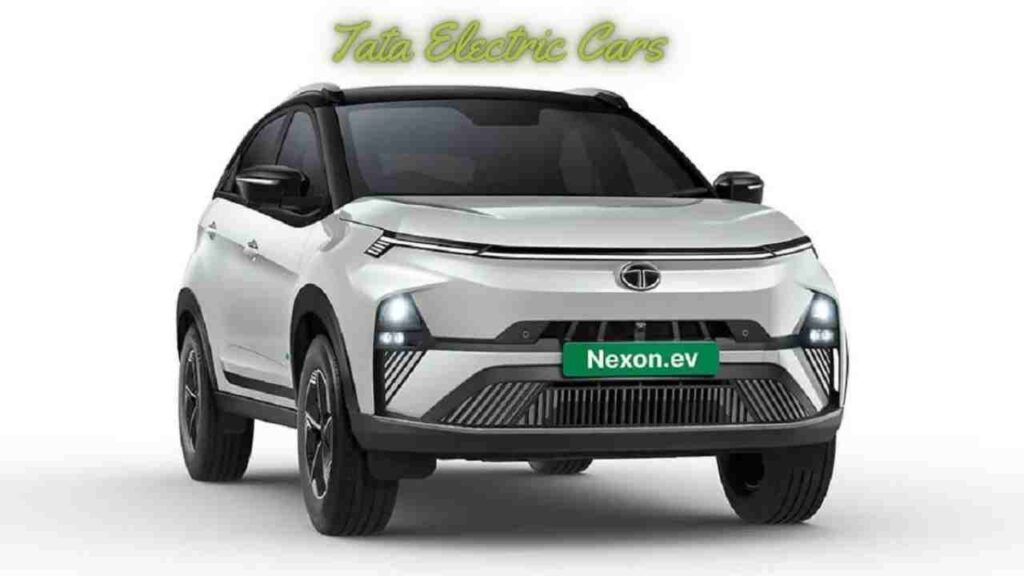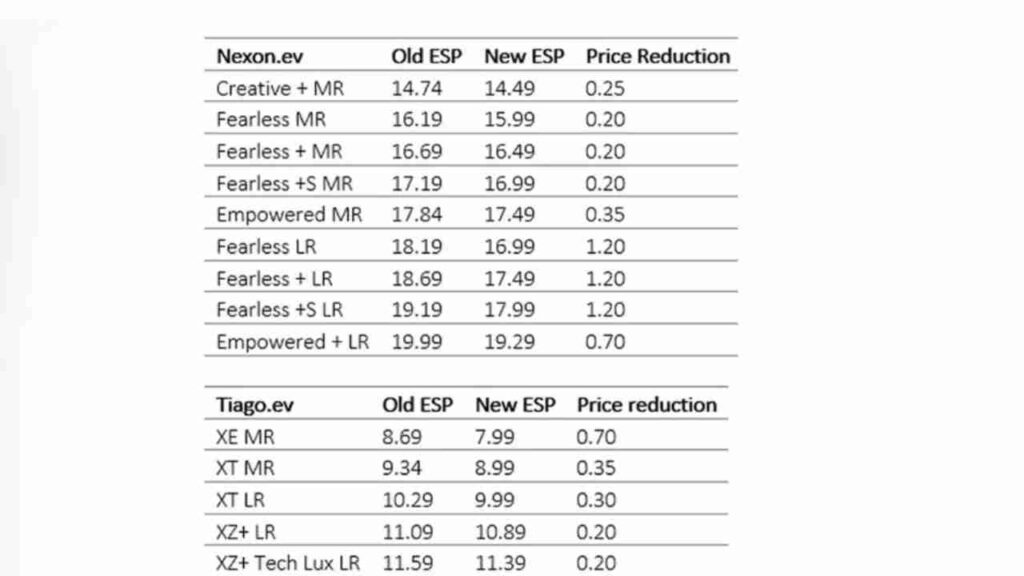Tata Motors Electric Cars : A Comprehensive Dive into the Recent Price Cuts and Market Dynamics
Tata Motors Electric Cars : The Indian electric vehicle (EV) landscape is undergoing a revolutionary transformation, with major automakers like Tata Motors and MG Motors leading the charge. Recent announcements from these industry giants reveal a substantial reduction in the prices of their electric car models, marking a pivotal moment in making electric mobility more accessible for the masses.

Tata Motors’ Strategic Move:
In a bold strategic move, Tata Motors, through its subsidiary Tata Passenger Electric Mobility (TPEM), has implemented significant price reductions for its Nexon.ev and Tiago.ev models. The Nexon.ev prices have witnessed a notable decrease of up to ₹1.2 lakh, while the Tiago.ev prices have been equally slashed by up to ₹70,000. This proactive decision is directly linked to a reduction in battery costs, a substantial component of an EV’s overall cost structure.
Details of Price Reduction:
The revised prices for the Nexon.ev MR (Medium Range) now start from ₹14.49 lakh, Nexon.ev LR (Long Range) from ₹16.99 lakh, and the Tiago.ev from an appealing ₹7.99 lakh. Mr. Vivek Srivatsa, Chief Commercial Officer at TPEM, has emphasized that the motive behind these price adjustments is to proactively pass on the benefits of reduced battery costs directly to the customers. As battery cell prices continue to soften, and with the anticipation of further reductions, Tata Motors aims to make EVs more accessible on a nationwide scale.

Market Trends and Battery Cost Dynamics:
The strategic decisions made by Tata Motors align seamlessly with broader market trends. Reports indicate a substantial 14% decline in lithium-ion battery prices over the past year. This downward trajectory is expected to persist, driven by the cooling off of commodity prices. Automakers, recognizing this opportune moment, are taking bold steps to make electric vehicles more affordable. This bodes well for the future of electric mobility in India, portraying a positive outlook for consumers and the industry alike.
MG Motors’ Parallel Move:
In a synchronized move, MG Motors has also embraced the trend of price reductions. Earlier this month, the company slashed prices for its MG Comet EV by impressive amounts ranging from ₹99,000 to ₹1.40 lakh. In addition to the price cuts, MG Motors introduced a more economical variant of the ZS EV, aptly named “Executive,” priced at a competitive ₹18.98 lakhs. Gaurav Gupta, Deputy Managing Director at MG Motors, has cited “long term key commodities cost rationalization” as the driving force behind this strategic move.
SEE ALSO : Maruti Suzuki ke Gujarat Factory mein Electric SUV eVX ki Shuruaat
FAQs on Tata Motors and MG Motors Electric Car Price Reductions:
- Why did Tata Motors reduce the prices of its Nexon.ev and Tiago.ev models?
- Tata Motors reduced the prices in response to a significant decrease in the cost of lithium-ion batteries, which constitutes a substantial part of an electric vehicle’s overall cost.
- What is the extent of the price reduction for Nexon.ev and Tiago.ev?
- The Nexon.ev prices have been reduced by up to ₹1.2 lakh, while the Tiago.ev prices have been slashed by up to ₹70,000.
- What are the new prices for Nexon.ev MR, Nexon.ev LR, and Tiago.ev?
- The new prices for Nexon.ev MR (Medium Range) start from ₹14.49 lakh, Nexon.ev LR (Long Range) from ₹16.99 lakh, and Tiago.ev from ₹7.99 lakh.
- How does Tata Motors justify the price reduction?
- According to Mr. Vivek Srivatsa, Chief Commercial Officer at TPEM, Tata Motors aims to pass on the benefits of reduced battery costs to customers, with an anticipation of further reductions in the future.
- What market trends are influencing these price adjustments?
- Reports indicate a 14% decline in lithium-ion battery prices last year, and the downward trajectory is expected to continue due to cooling commodity prices.
- How has MG Motors responded to the market dynamics?
- MG Motors has also reduced the prices of its MG Comet EV by amounts ranging from ₹99,000 to ₹1.40 lakh and introduced a more affordable variant of the ZS EV called “Executive” at ₹18.98 lakhs.
- What is the reason behind MG Motors’ price reduction?
- Gaurav Gupta, Deputy Managing Director at MG Motors, cited “long term key commodities cost rationalization” as the driving force behind their strategic move.
- What does this paradigm shift in electric car prices indicate for the future of EVs in India?
- The price reductions by Tata Motors and MG Motors suggest a positive trajectory for the widespread adoption of electric vehicles in India, making them more accessible and affordable for a larger audience.
- How do these price adjustments align with broader market trends?
- The price adjustments align with a broader market trend of decreasing lithium-ion battery prices and the overall softening of commodity prices.
- What can consumers expect in terms of the future affordability of electric vehicles in India?
- With the reduction in battery costs and ongoing market dynamics, consumers can anticipate a more affordable and accessible electric vehicle market in India, fostering sustainable and eco-friendly mobility options.
Conclusion: Tata Motors Electric Cars
The recent price reductions by Tata Motors and MG Motors signify a paradigm shift in the affordability of electric cars in India. As these automakers respond dynamically to the softening of battery costs and implement strategic measures to rationalize overall expenses, the EV market in the country is poised for substantial growth. The collective efforts to make EVs more accessible and affordable paint a positive trajectory for sustainable and eco-friendly mobility options. With advancements in battery technology and the realization of economies of scale, the vision of widespread EV adoption in India appears more attainable than ever, promising a cleaner and greener future for the automotive industry.















